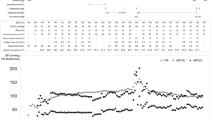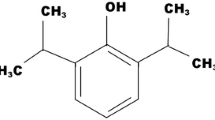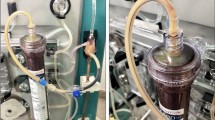Abstract
Review of the literature shows no standard of care for the treatment of propofol infusion syndrome. Our case shows a potential therapeutic approach to cure lactate acidosis caused by propofol, which is a rare but life-threatening complication in (pediatric) intensive care patients. We report the case of a 9-year-old, healthy boy who suffered an inhalative trauma after a fire in his parents’ apartment. Following sedation in the pediatric intensive care unit with propofol (5 mg/kg/h) for a duration of less than 48 h, he developed laboratory findings consistent with propofol infusion syndrome. Due to lactate acidosis and a suspected cyanide intoxication the patient received hydroxocobalamin. The lactate acidosis resolved seven hours after treatment. Hydroxocobalamin should be evaluated for the treatment of propofol infusion syndrome for its potential to prevent mitochondrial apoptosis caused by reactive oxygen species generation in the electron transportation chain. Hydroxocobalamin should thus be considered in other entities of drug induced disruption of the electron transportation chain causing lactate acidosis as well.
Similar content being viewed by others
Data Availability
Patient data is reported anonymized; the underlying data is stored in the KIS of the original hospital. No other data about this case has been reported elsewhere.
Code Availability
Not applicable.
Abbreviations
- ALT :
-
Alanine-aminotransferase
- AST :
-
Aspartate-aminotransferase
- CK :
-
Creatine kinase
- COHb :
-
Carboxyhemoglobin
- ECG :
-
Electrocardiogram
- ETC:
-
Electron transport chain
- FiO2 :
-
Inspiratory oxygen concentration
- LDH :
-
Lactate dehydrogenase
- PICU:
-
Pediatric intensive care unit
- pO2 :
-
Partial pressure of oxygen
- PRIS :
-
Propofol-infusion-syndrome
- ROS:
-
Reactive oxygen species
- RSI :
-
Rapid sequence induction
- %TBSA:
-
Total body surface area
References
Hemphill Scott, et al. Propofol infusion syndrome a structured literature review and analysis of published case reports. Br J Anaesth. 2019;122(4):448–59. https://doi.org/10.1016/j.bja.2018.12.025.
Sumi Chisato, et al. Propofol induces a metabolic switch to glycolysis and cell death in a mitochondrial electron transport chain-dependent manner. PloS One. 2018;1(2):e0192796. https://doi.org/10.1371/journal.pone.0192796.
Taboulet P, Clemessy JL, Freminet A, Baud FJ. A case of life-threatening lactic acidosis after smoke inhalation - interference between beta-adrenergic agents and ethanol? Intensive Care Med. 1995. https://doi.org/10.1007/BF01700670.
Culnan Derek M, et al. Carbon monoxide and cyanide poisoning in the burned pregnant patient an indication for hyperbaric oxygen therapy. Ann Plast Surg. 2018;80(3):S106–12. https://doi.org/10.1097/SAP.0000000000001351.
Barillo David J. Diagnosis and treatment of cyanide toxicity. J Burn Care Res Off Pub Am Burn Assoc. 2009;30(1):148–52. https://doi.org/10.1097/BCR.0b013e3181923b91.
Machado M, Willardson JM. Short recovery augments magnitude of muscle damage in high responders. Med Sci Sports Exerc. 2010;42(7):1370–4. https://doi.org/10.1249/MSS.0b013e3181ca7e16.
Kim SG, Woo J, Kang GW. A case report on the acute and late complications associated with carbon monoxide poisoning: acute kidney injury, rhabdomyolysis, and delayed leukoencephalopathy. Medicine (Baltimore). 2019;98(19): e15551. https://doi.org/10.1097/MD.0000000000015551.
Lenaz G, Tioli G, Falasca AI, Genova ML. Complex I function in mitochondrial supercomplexes. Biochim Biophys Acta. 2016;1857(7):991–1000. https://doi.org/10.1016/j.bbabio.2016.01.013.
Mirrakhimov Aibek E, et al. Propofol infusion syndrome in adults: a clinical update. Crit Care Res Pract. 2015;2015:260385. https://doi.org/10.1155/2015/260385.
Fontaine E. Metformin-induced mitochondrial complex I inhibition: facts, uncertainties, and consequences. Front Endocrinol (Lausanne). 2018;9:753. https://doi.org/10.3389/fendo.2018.00753.
Hsieh VC, Krane EJ. & Morgan PG. Mitochondrial disease and anesthesia. J Inborn Errors Metab Screen. 2017. https://doi.org/10.1177/2326409817707770
Author information
Authors and Affiliations
Contributions
L. Lindemann conceived and wrote the article. PD Dr. med. S. Frees edited the article. All authors read and approved the article.
Corresponding author
Ethics declarations
Ethics Approval
Not applicable.
Consent to Participate
Not applicable.
Consent for Publication
Yes, written consent is available.
Competing Interests
Not applicable.
Additional information
Publisher's Note
Springer Nature remains neutral with regard to jurisdictional claims in published maps and institutional affiliations.
This article is part of the Topical Collection on Medicine
Rights and permissions
Springer Nature or its licensor holds exclusive rights to this article under a publishing agreement with the author(s) or other rightsholder(s); author self-archiving of the accepted manuscript version of this article is solely governed by the terms of such publishing agreement and applicable law.
About this article
Cite this article
Lindemann, L., Frees, S. Could Hydroxocobalamin Be of Use in the Treatment of Lactate Acidosis Induced by Propofol Infusion Syndrome? - A Case Report. SN Compr. Clin. Med. 4, 204 (2022). https://doi.org/10.1007/s42399-022-01286-y
Accepted:
Published:
DOI: https://doi.org/10.1007/s42399-022-01286-y




